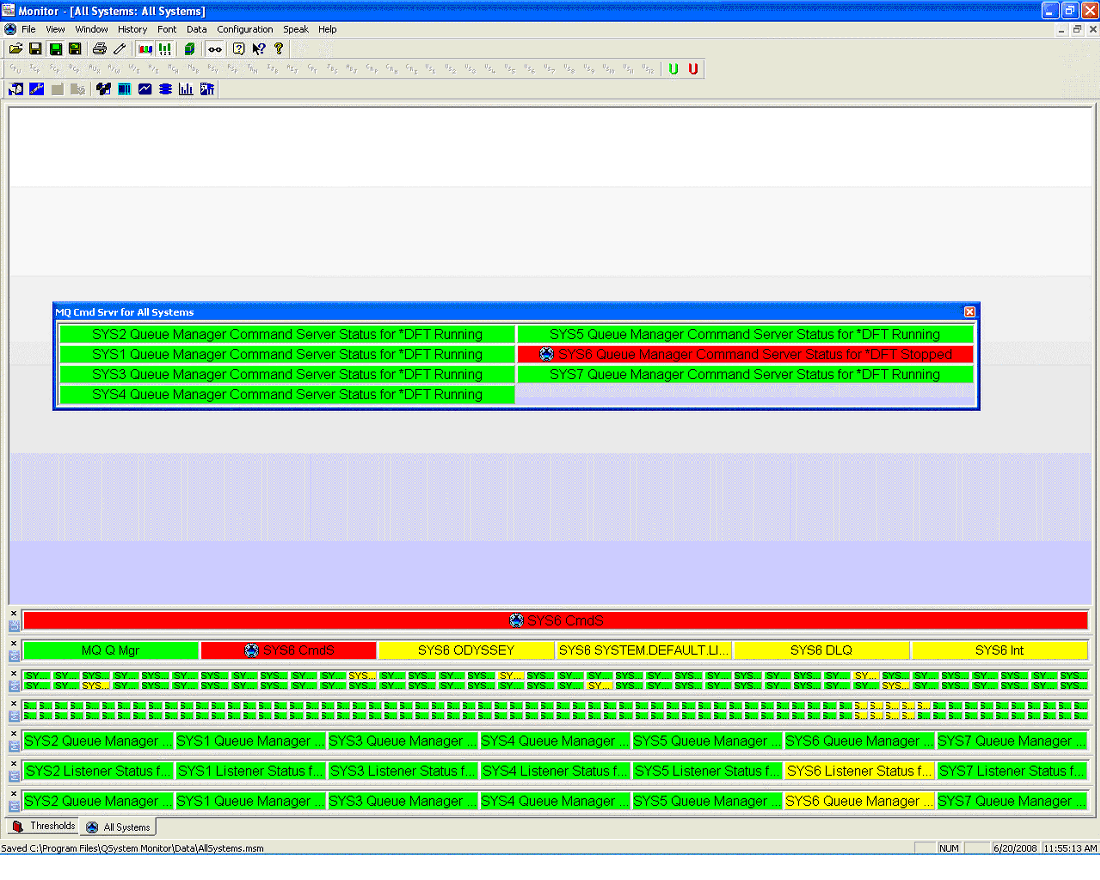CCSS, known for its systems management and performance monitoring solutions on IBM Power Systems, today announced a new product innovation--MQSeries Monitoring. The new collection of monitoring functions is part of the latest release of the company's system performance monitoring and reporting solution, QSystem Monitor V12 (R9), and marks CCSS's entry into the complimentary area of application monitoring, the company said.
The new monitoring functions target four components of MQSeries: MQ Queue Managers, MQ Listeners, MQ Channels, and MQ Queues. (MQSeries is an IBM software family of middleware components used for business integration.) Development managers will now be able to address each component of MQSeries with a collection of dedicated monitors that extend all the benefits of proactive monitoring and management found in the QSystem Monitor environment. Increased efficiency, faster problem identification and resolution, and generally more time free due to automation are just a few of the benefits enjoyed by system managers who use QSystem Monitor, the company reports.
Ray Wright, managing director of CCSS, explains why CCSS has now embraced application monitoring: "In many ways, this MQSeries monitoring functionality is a very natural extension of the traditional system monitoring we focus on in our core business. We've always believed that improving systems management for customers was as much about helping them to create a proactive approach to management as it was about any one particular function or feature of our solutions. With that in mind, many customers that had already made this transition wanted to extend the same approach to core applications, and more specifically, to their MQSeries environment. Happily, the structure of the MQSeries solution lends itself so well to this type of approach--we feel that it's a very complementary addition of functionality to QSystem Monitor and one that customers will feel is intuitive to use."
New monitors for MQ Queue Managers will keep a watchful eye on four key elements including the status of the MQ Queue Manager itself, the Command Server Status, Initiator Status and Connection Count. Status monitoring is vitally important since if any one of these elements were to become inactive and weren't immediately detected, requests wouldn't be issued or received, channels wouldn't be started, and the Queue Manager would stop running. Similarly, the status of critical MQ Listeners, which must be started for MQ communications to be received, can now be monitored around the clock.
Additional monitors for MQ Channels include a number of performance indicators which can assist in fast problem resolution. These comprise Bytes Received/second, Bytes Sent/second, Compression Ratio, Compression Time, Exit Program Time, and Network Time. As with all such metric measurements, users are able to define thresholds for each one. They will be automatically alerted (via SMS, email or pager) should a breach occur. The Average Message Time on Queue is another important monitor since any spikes in the time spent on a queue prior to processing could be an indication of a problem elsewhere (for example, the communications environment) that is directly impacting the queue and causing a delay.
Completing the roundup of new MQSeries monitors are those that surround the MQ Queues. These include Application Status, Age of Oldest Message, Average Queue Time, and Queue Depth, all of which offer insight into unresolved issues. Queue Depth/Maximum gives users a percentage view of the number of messages--often a more meaningful expression than a straight number count. Similarly, Queue Depth/Trigger offers a view of the number of messages as a percentage of the trigger depth. In this case, a figure of 100 percent would mean that a trigger program or event should have taken place. Open Count-Input and Open Count-Output monitors show the number of applications that are putting on and taking off messages from a queue. Depending on the time of day, if either of these two monitors were to read zero, there could be a problem preventing the applications from interacting with the queues.
The final two monitors for MQ Queues are the Uncommitted Message Count and the Dead Letter Queue. The first is an important check as it identifies messages in a queue that were unable to be sent. Resolving the problem with these puts the messages back in queue or, alternatively, the administrator can choose to delete them. Uncommitted messages, by definition, exist in this queue if they are problematic. If MQ cannot send a message for a particular period of time, it will be sent to the Dead Letter Queue. Proactive environments can set a threshold of 1 for this particular monitor to maintain rigorous, precision control of the MQSeries environment.
In addition to the newly created monitors, many of QSystem Monitor's existing functions play neatly into the MQSeries environment such as IFS Monitoring (as MQSeries files are stored here), Subsystem/Job Monitoring (as MQSeries runs in its own subsystem) and Thread and Library Monitoring (showing the number of threads as a measure of activity and dedicated MQ Libraries for each Queue Manager.)
MQSeries Monitoring is available in QSystem Monitor V12 (R9) scheduled for July release. Contact your CCSS representative for details or visit http://www.ccssltd.com/.

About CCSS
CCSS develops, supports and markets IBM Power Systems (System i/ iSeries) performance monitoring and reporting, message management, and remote management solutions. An Advanced IBM Business Partner, CCSS develops powerful solutions to support some of the world's most demanding System i environments across many industries including insurance, banking, pharmaceutical, and manufacturing. All CCSS solutions are IBM ServerProven. CCSS is headquartered in Gillingham, Kent, UK with key regional headquarters in Raleigh, N.C., Bonn, Germany, and Makati City, Philippines together with a global agent network spanning Portugal, Brazil, the Netherlands, Switzerland, and Sweden.







LATEST COMMENTS
MC Press Online